#American Goodwill Ambassadors
Explore tagged Tumblr posts
Text
Political Themes In Mario
So there are people nowadays that complain about "politics" being "forced" in media such as Mario, whether or not this is the case. They often go on to say they just want things like Mario to be an escapist fantasy and to keep politics out. So I wanted to talk about political themes in Mario games similar to how I did for Sonic.
So to start off we have the 2 kingdoms the Mushroom and Koopa Kingdom which are constantly in conflict bringing monarchies into the mix. Peach in particular has asked Mario and Yoshi to help the Jewelry Land out from Bowser's conquest in Yoshi's Safari.
She also has at least tried to met with the goodwill ambassador of the Beanbean Kingdom in Superstar Saga, she tried to deal with blorbs outbreak in Inside Story when she held a meeting, and has met with other Kingdom rulers such as Prince Florian.
There is also several kings she rulers over and vast amounts of land that make up the Mushroom Kingdom such the Eastern and Western territories.
There is also the themes of exchange rates of coins and borders established in Superstar Saga.
We also can't forget about the entire Koopa Army's existence.
In Odyssey it is established places like New Donk City hold elections for mayors as Pauline was elected to be the mayor.
Meanwhile in on Isle Delfino has an entire jury system that convicts Mario, alongside law enforcement.
In Super Mario Sunshine Bowser Junior pollutes Isle Delfino which Mario gets blamed for and has to clean up. This game as such themes are pollution ruining a beautiful island and disrupting the lifestyle of the islanders.
Speaking of pollution we can't forget about the Kremlings and how they not only polluted DK Island with Kremkroc Industries, but their homeland. As seen in Donkey Kong Country 2: Diddy's Kong Quest, Crocodile Island has a been almost completely ruined by the Kremlings create a dark polluted atmosphere.
All of this creating an environmentalist theme to these games.
Now while some people might say environmentalism shouldn't be regarded as political which I agree with, it has been made political by other people. With many of the people who complain about politics in media often complaining about environmentalism viewing it in media as inherently political. This is why I am including it.
On top of that there is the hypothesis the Kremlings and K. Rool particularly in the Donkey Kong Country 1 could possibly represent a real world event and person.
More on the environmentalism theming, there is the existence of the Wild Yoshi Sanctuary and possible rewilding of Yoshies.
Plus dinosaurs are often made inherently political by some people because of prehistory and evolution.
Also, of the Kremling, pirates are also political because of their connection to monarchies historical, especially being true for the Kremlings.
Finally Mario and Luigi are immigrants which should be self explanatory. In the games they lived in New Donk City for a time, while in the movieverse they are Italian-American immigrants living in Brooklyn, and many continuities.
Mario and Luigi are plumbers and went through many working class jobs in the past like construction, bottling, and cement.
On top of that Mario fought in an unnamed war as well in Mario Bombs Away.
And one extra thing Bowser especially in the movie can represent toxic masculinity, and someone who can never take no for an answer. Such a theme is often made inherently political by some people.
Also, the way Peach is described by Miyamoto can also be viewed as inherently political by certain people who hate the mere thought of someone like Peach being like that.





#mario bros#super mario bros#mario#super mario#mario canon#mario lore#politics in mario#political themes in mario#mario environmentalism#beanbean kingdom goodwill ambassador#bowser's toxic masculinity#pirates in mario#kremkroc industries#crocodile island#kremlings#isle delfino#isle delfino pollution#pollution in mario#wild yoshi sanctuary#mario and luigi are italian american immigrants#mario and luigi are native sons of the mushroom kingdom#elections in mario's world#isle delfino jury#pianta judge#pianta jury#prince pine#prince florian#flower kingdom#jewelry land#polluted piranha plant
15 notes
·
View notes
Text

chapter one: hi it's me you're all in danger summary: worldwide fame and a political tie or two has you--one of the biggest pop stars around--in dire need of reliable protection. thankfully you have four ex-military retirees to entrust your wellbeing to. but what happens when that protection turns possessive? rating: pg-13 (rating will increase across certain chapters) pairing: f!reader/task force 141 next chapter
as a longtime charli xcx fan, can't say i expected my brat autumn to be spent writing about the cod mfs 😭😭
-----------------
10 AM. London. Shangri-La. Hotel bar.
Somehow, being surrounded by opulence, prestige, and elegance made particular four men currently seated in the back of the space feel a bit out of place.
But they were here on a mission.
Or rather, a job now.
The days of being out on the field in camo fatigues were of the past. Now they were all seated together in suits–black and white, jacket, tie, pants and polished shoes–gin and lemon water on the table.
There was a bit of restlessness in the air and it was starting to spill out in the conversations shared amongst the four.
“Simon, would it literally kill ya to show yer mouth, man? Dae ya want the lass to think yer sick as a first impression?”
“A bit of mystery could be fun, no?”
“Are ya Scooby fuckin’ Doo or somethin?!”
“Johnny, can you keep it down? Your mohawk’s already gotten us enough looks as it is.”
“And what’s so wrong with a lil’ business casual, Kyle?!”
“Can you muppets keep it down!?”
The harsh lash of Price’s tongue had postures straightened and lips hushed.
With a sigh, he brought his fingers to his temple, wondering how he managed to save the world over and over again with these three. Still, his eyes flickered to his watch as he checked the time, a conversation from a month ago coming to mind.
“Price.”
A hand was extended out to him. Fluorescent lights at the American embassy in Paris hung above. Murmurs of French and English lingered in the air as the day proceeded.
Price grinned, returning the exchange with a firm handshake. “Miller. Good to see you standing, old friend.”
Moments later the conversation was held at Miller’s office, a familiar place during the times Price had visited. What stood out to him most was the newly framed photo of Miller and his blushing bride, Priscilla.
A miraculous matrimony all things considered.
Miller, an American ambassador. Priscilla, an activist whose loud and mighty voice helped push for change within socio-political and environmental spaces.
It wasn’t as if it was absolutely impossible for the two to meet–rather, it was just the fact they met after being held hostage alongside other world leaders and activists during a goodwill gala held at Berlin. Terror wished to deliver a haunting message to all of the world, with similar sieges held at other massive events, but thankfully the work of 141 and other allies blocked the reception.
Price glanced down at Miller’s desk, where a few pictures of a glamorous woman were splayed across files: a pop star by the name of Dollface. Formerly part of beloved girl group 4EVA, now setting the music scene alight with impeccable music production, godly vocals, and captivating choreography.
Or so he’s heard.
Right beside her was a clipped out headline from a newspaper:
Glastonbury Saved! Tragedy Averted from Terrorist Threat!
A job well done–courtesy of a certain phantom soldier.
“–I know your days of military campaigns are over, but this has been tearing Priscilla apart,” Miller sighed morosely. “While I know this is the fault of no one and she understands that change in the world comes at a cost, the fact that terrorists would target her niece’s festival performance has been haunting her.”
“Revolution does not come easy, that’s for certain,” Price mused as he glanced over at his friend’s face with an affirming nod. “Even so, it’s something still worth fighting for.”
Miller sighed out in agreement. “Of course.”
“So then.” Adjusting his posture, Price then continued, his tone light, “What can I and a few recently retired soldiers do for you, mate?”
His shoulders relaxing, Miller then reached down for one of the photos of the pop star, pushing it over towards Price. “Watch her. Protect her, please. She’s been an anxious mess ever since Glastonbury.” Gazing down at the newspaper headline clipping, he continued, “Her career’s at such a critical point and her first solo world tour’s been delayed enough as it is. Pressure’s everywhere–label, fans, the media. I know she wants more than anything to finally move forward. But–”
Gingerly picking up the photo, Price took in every single detail of the woman.
Of you.
Turning his focus back to Miller, he grinned, brows raising. “A bit of Price Protection and Co. could do wonders, yeah?”
“You’d be doing miracles, friend” was the response received, along with a vigorous nod.
Price held out his hand.
“It’s a deal.”
And now, the gang was all here, even though the gang was currently driving Price up the wall. Still, if there was anyone who he trusted to get the job done on behalf of a dear old friend, it was Gaz, Ghost, and Soap.
Or rather, from here on out: Kyle, Simon and Johnny.
It didn’t hurt that the gig paid quite handsomely–your label desperately wanted you to get back on stage one way or another. Since the Glastonbury incident, you’ve since been spending your days in London, far too afraid to leave anywhere. The plan was to slowly draw you out of your shell by planning all promotional endeavors around the UK before you would travel the world as intended.
Before any of that however, the first key matter of business is for the five of you to meet together.
10:15 AM. London. Shangri-La. Hotel bar.
“What do you lot think? Full glam or lowkey?” Kyle spoke up, now peering over to look at Johnny’s phone, who had brought up one of your music videos.
Price glanced over, seeing slick skin, big curls, gyrating hips, rouge lips, white heels, and sparkling eyes.
Such visuals were definitely not on Miller’s desk when discussing the job.
“Like right now?” Johnny queried back.
“Lowkey without question.” Simon folded his arms across his chest, his eyes peeking at Johnny’s phone, his expression reflective.
A sudden tap on the back of Price's shoulder just a moment later soon caught his attention.
“Mr. Price…?”
He immediately turned back, the others following suit.
Johnny’s eyes widened, immediately switching off his phone to shove into his pocket.
Lowkey was correct.
A cap, oversized t-shirt with shorts hidden beneath, hair down, tennis shoes, a pair of sunglasses that were soon slipped off.
The contrast between who they saw on screen to who they were seeing now couldn’t be any more apparent.
Still, even by the way you stood before him, posture shrunken back slightly, eyes a bit downcast, voice softer than the usual bubbly vocals of your music, there was this grace, this aura that you exuded–one that spoke of a true bonafide performer rather than a mere average person.
Smiling warmly, Price held his hand out towards you for you to shake. “That would be me, dear.”
“Uncle Miller’s told me lots about you.” You smiled, bringing your hand up to take his.
So much smaller than his, he noted to himself, chuckling as he responded with, “I hope they’re my finer moments.”
Giggling in response, you affirmed, “As he said, only the best unclassified stuff. I’m Doll–” You quickly stopped yourself, opting to give your first name instead.
“Face pretty like a doll’s still,” Johnny murmured over to Kyle, who nodded in agreement.
Simon didn’t say anything but instead allowed his arms to rest by his sides, continuing to quietly observe you.
A world-renowned pop star with four former soldiers tasked to serve as her bodyguards.
Should be an easy enough job.
-----------------
thank you for reading !!! i know i tend to not really do multi-chapter pieces but idk the ghost of brat summer took over me after seeing a clip of soap and simon banter so i've been genuinely locked in with writing out this tale 🧍♀️🧍♀️
subsequent chapters are going to be loosely tied together but i hope you enjoy my take on cod yumejo with this pop star otome 🙇♀️🙇♀️
next chapter's up next friday !!! 🤸♀️🤸♀️
#call of duty x reader#cod x reader#task force 141 x reader#task force 141 x you#soap x reader#johnny mactavish x reader#ghost x reader#simon riley x reader#gaz x reader#kyle garrick x reader#captain john price x reader#price x reader#reader insert#bodyguard by lovehotelreservation#Fic
159 notes
·
View notes
Text

THURSDAY HERO: Moe Berg
Ballplayer And Spy: Moe Berg
Helped Stop Germany From Getting The Bomb
Moe Berg was an American original: a major league baseball player and a wartime spy. Born in 1902 and raised in a poor Jewish family in New York City, Moe was a bright, charismatic boy and a top student in high school. He attended Princeton on an academic scholarship, one of only a few Jewish students at the prestigious college.
At Princeton, Berg studied languages – he ultimately learned seven – and became the star shortstop on the college baseball team. He wanted to attend graduate school at the Sorbonne in France, but couldn’t afford it. Instead he chose a very different career path. After being recruited in college, Moe signed a contract to play shortstop for the Brooklyn Dodgers.
He wasn’t the best hitter, and was sent to the minors in 1924, but returned to the majors in 1926 as a catcher with the Chicago White Sox. Incredibly, he attended Columbia Law School in the off season, and earned his degree while on the White Sox. Moe played 15 seasons in the major leagues, including stints on the Cleveland Indians and Boston Red Sox. Known as “the brainiest guy in baseball,” Moe was asked why he “wasted” his intelligence playing sports, he said, “I’d rather be a ballplayer than a justice of the U.S. Supreme Court.”
In 1934, Moe joined a traveling all-star team, along with Lou Gehrig and Babe Ruth. In Tokyo he delivered a speech in Japanese. Unknown to his fellow players, Moe had been recruited as a spy by the U.S. government, and while in Tokyo he carefully photographed the city. Moe’s images were later used by the U.S. Army for bombing raids on the Japanese capital . As a Jew, Moe wanted to fight Nazis, and he volunteered to serve when the United States entered World War II.
Moe became a Goodwill Ambassador, traveling to South America and Asia. Moe made a radio speech in Japanese to the people of Japan urging them not to fight a war they could not win. After his stint as an ambassador, Moe became an agent in the Office of Strategic Services (the forerunner of the CIA). He taught himself nuclear physics, then traveled throughout Europe to collect information about atomic bomb development. His fame and charisma enabled him to form intimate friendships with important military, political and cultural leaders.
Moe’s extensive spy work uncovered an atomic bomb factory in Norway that was developing the bomb for Germany. Using Moe’s intel, Allied forces bombed the factory and stopped Germany from getting the bomb. Moe was at great risk in Europe because he was Jewish, but he refused to return home, instead spending much of 1944 and 1945 helping American troops in Europe capture atomic scientists who were working with the Germans. When the war ended, Moe Berg was offered the U.S. Medal of Merit, the highest award given to a civilian during the war, but he modestly declined.
In 1951, Moe asked the CIA to send him to the newly founded State of Israel. “A Jew must do this,” he said. The request was refused but Moe was hired by the CIA to go through his old contacts from wartime to get information on the Soviet atomic bomb project. He left the agency in the early 1950’s, and for the next few decades Moe lived a quiet life. He worked as a coach for a few years, but never found another steady career.
A lifelong bachelor, Moe died in 1972 at his sister’s home in New Jersey, at age 70. Moe’s last words were, “How did the Mets do today?” His former Ted Lyons remembered, “A lot of people tried to tell [Moe] what to do with his life and brain and he retreated from [baseball]… He was different because he was different. He made up for all the bores of the world. And he did it softly, stepping on no one.”
Moe Berg’s is the only baseball card on display at the headquarters of the Central Intelligence Agency.
For his contributions to the world of sports and to the safety of our country, we honor Moe Berg as this week’s Thursday Hero.
26 notes
·
View notes
Text
10 Cool Jewish Women from Modern Day! Part 2 because I'm on a role
Liz Kleinrock, a self-described "Korean, Jewish, queer, transracial adoptee, antibias and antiracist nationally recognized educator, author, and consultant." Born in Korea, she was adopted by an Ashkenazi Jewish family in Washington D.C.. Involved in education, with a Masters in UCLA's Teacher Education Program, she has taught in California and D.C., and has also worked as a school librarian. In 2018, she received Learning for Justice's Award for Excellence in Teaching.
Loolwa Khazzoom, an Iraqi-American writer, journalist, activist, musician, and feminist. She was heavily involved in the Jewish feminist movement of the 1990s and is the founder of the Jewish Multicultural Project, which provides resources to Jewish communities about diversity in Jewish culture. She has also been involved in SOJIAC and JIMENA. Raised in California to an American Jewish mother and an Iraqi Jewish father, she graduated from Barnard College in 1991. She participated in a filming about the interplay of race and gender in America called The Way Home. She is the lead singer and bass player of Iraqis in Pajamas, a punk rock band that uses traditional Iraqi and Jewish musical elements.
Ariela Sofer, and Israeli and American operations researcher who is a professor of systems engineering and operations research, as well as a Divisional Dean, at George Mason Acamdey. She is a published author, with two books on Lineaer and Nonlinear Programming. Named as a Fellow of the Institute for Operations Research and the Management Sciences in 2016, she is also a Fellow of the Institute of Industrial and System Engineers and the International Council on Systems Engineering.
Ayelet Newman, also known as Ayelet the Kosher Comic, is an Orthodox stand up comedian. Born to a secular Jewish family on long Island, she pursued a career in TV and film after high school, appearing in The Hebrew Hammer. She became a baalat teshuva in the early 2000s, when she quit acting and began pursuing comedy, performing only for women.
Adina Sash, a Brooklyn raised American Jewish activist and social media influencer, also known as FlatbushGirl. Holding a Master's degree in Medieval literature from Brooklyn College, her online activism was started after receiving sexist comments. In 2017,s he launched a social media campaign called #FrumWomenHaveFaces that raised awareness of the erasing of women from Orthodox newspapers and magazine, gaining the support of Mayim Bialik (Jewish actress).
Tova Ben-Dov, former president of the Women's International Zionist Organization and former vice president of the World Jewish Congress, as well as a board member for the Jewish Agency for Israel and the International Alliance of Women. She joined WIZO as a young mother, and worked in the Chair of Women's Training Department of WIZO Israel. In 2011, she was awarded Honoree of Tel Aviv, and in 2016 the title of Honorary Fellow of the World Zionist Congress.
Kat Graham, an American actress, singer, dancer, author, and activist. Born in Geneva, Switzerland, to an Americo-Liberian father and a Polish and Russian Jewish mother. Co-founder of he wellness company Modern Nirvana, she had released work focusing on self-help. She speaks English, French, Spanish, and some Hebrew and Portuguese. She is known for her role as Bonnie Bennett on the CW show The Vampire Diaries, and has released two extended plays and four studio albums. She has done work as a Goodwill Ambassador for the UN Refugee Agency, inspired by her family's history.
Dafna Bar-Sagi, an Israeli born cell biologist and cancer researcher at New York University School of Medicine. She is member of the scientific advisory boards, including the National Cancer Institute. A graduate of Bar-Ilan, where she earned her undergraduate and master's in neurobiology, she received her PhD in neurobiology from the State University of New York as Stony Brook. Her research focuses on the nature of he Ras oncogene and how Ras signaling leads to tumor development. She has been the vice dean for science, chief scientific officer, and executive vice president of NYU Langone Health.
Malika Kalontarova, a Tajikistan born Bukharian dancer known as the "Queen of Tajik and Oriental Dance." Rebellious as a child, she has always identified as Jewish, despite Antisemitism in Tajikstan. Trained by Ghaffor Valamatzoda and Remziye Tarsinova, she moved to Queens in 1993 where she opened up her own dance studio.
Jazz Jennings, an American spokeswoman and Queer activist. An honorary co-founder of he TransKids Purple Rainbow Foundation, which her parents founded in 2007, she is one of the youngest documented people to be recorded as transgender. She was accepted into and currently attends Harvard University. In 2013, at only 13 years old, she founded Purple Rainbow Tails, while engaging in a battle with the USSF to allow her to play on a girls' soccer team. She is a published author, and in 2014 was named one of the top 25 most influential teens. She has voiced several characters in an animated shows, and starred in an Amazon Prime movie.
12 notes
·
View notes
Text
Carmen Miranda - The Brazilian Bombshell
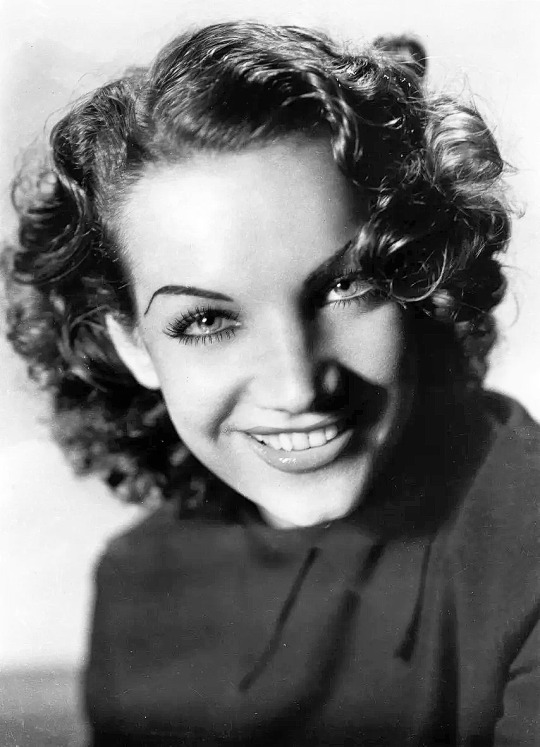
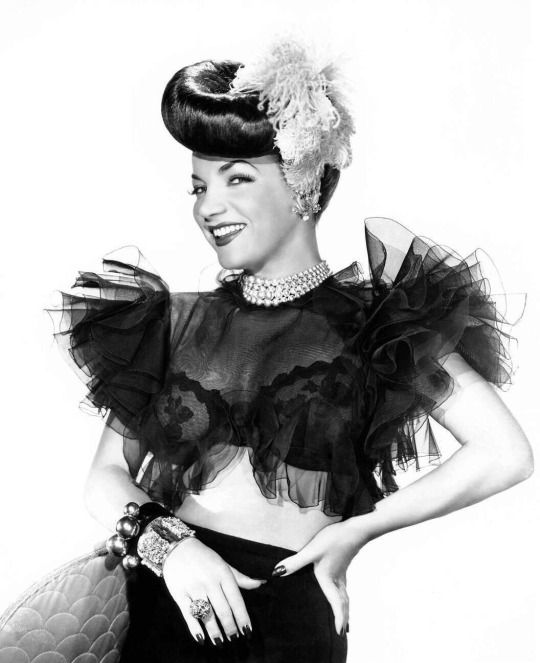

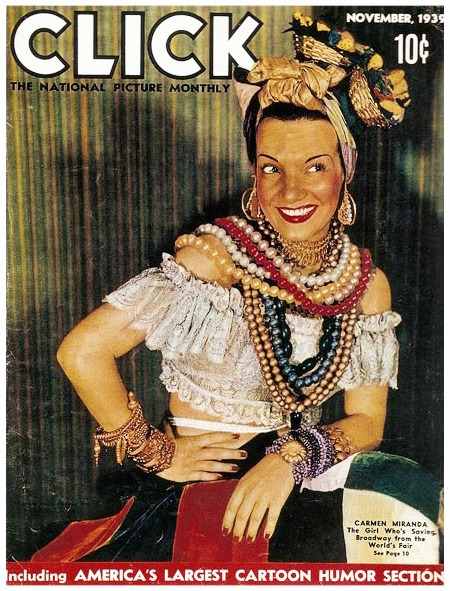
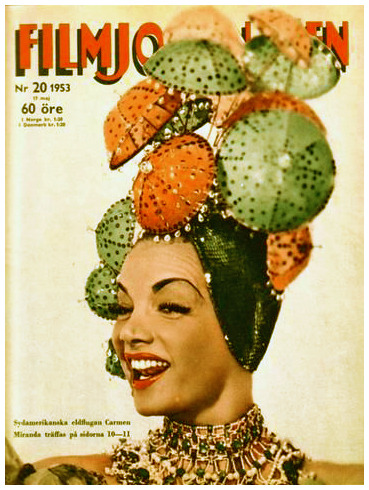
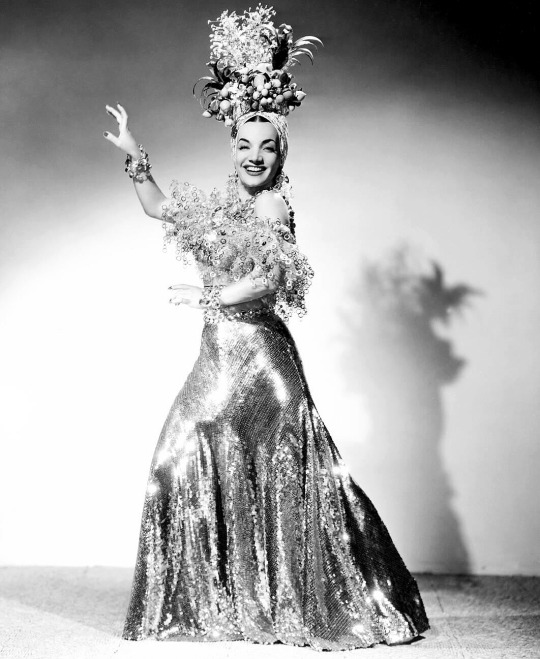
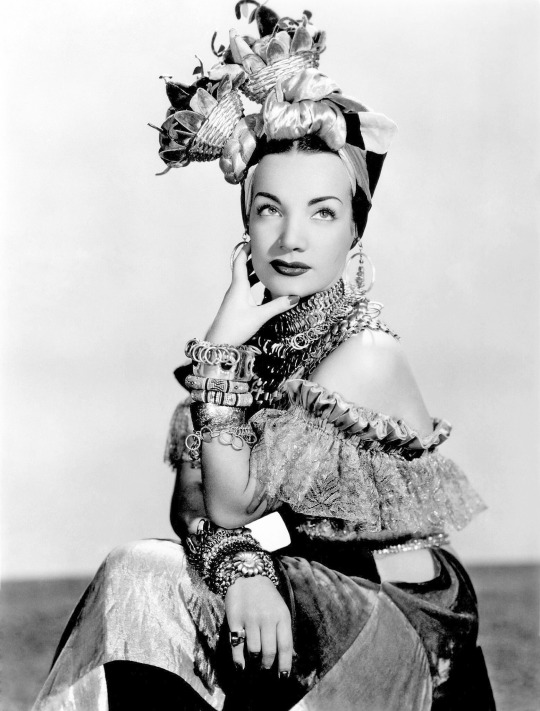
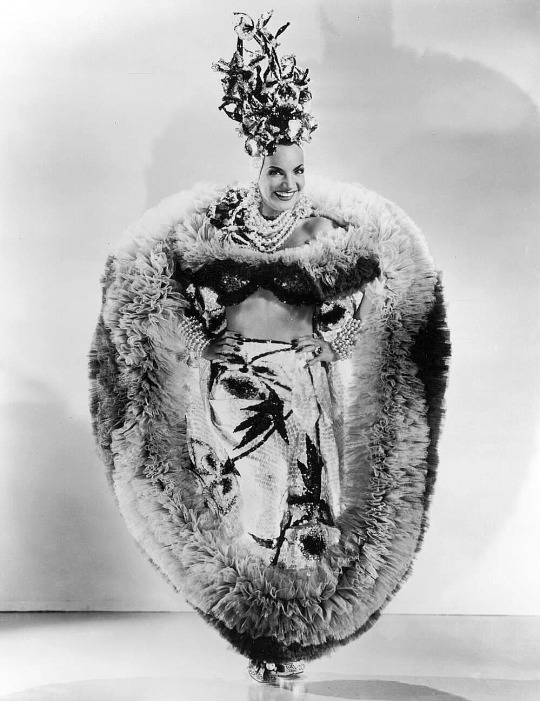
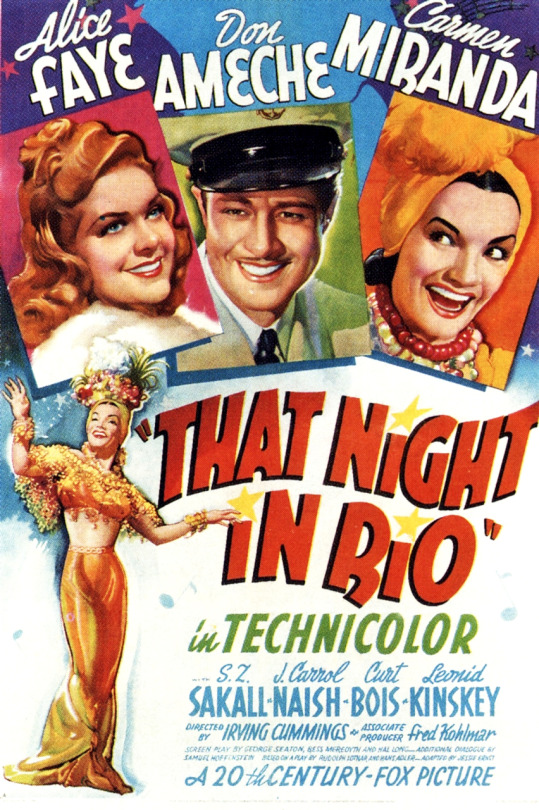
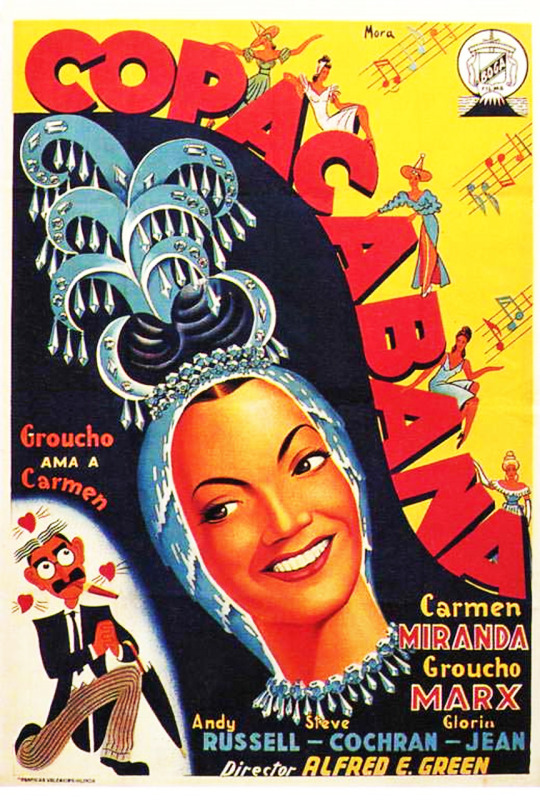
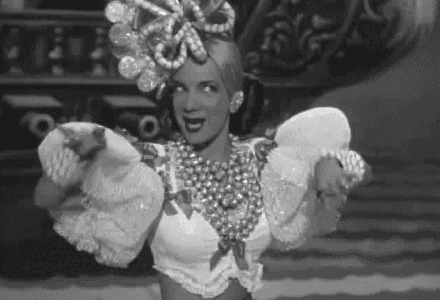
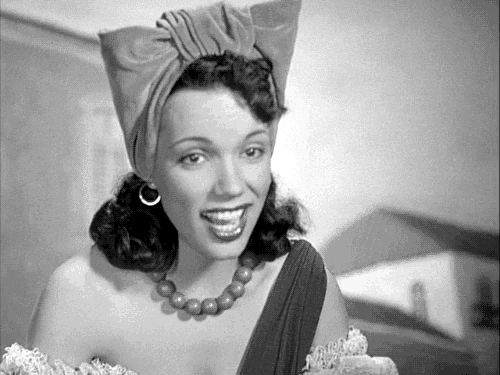
Carmen Miranda (born Maria do Carmo Miranda da Cunha in Marco de Canaveses, Porto on February 9, 1909) was a Portuguese-born Brazilian singer. Nicknamed "The Brazilian Bombshell", she was known for her sass and signature fruit hat outfit that she wore in her American films.
Miranda was introduced to a composer while working at her family's inn and soon recorded her first single in 1929. She then signed a two-year contract with Rádio Mayrink Veiga, the most popular Brazilian station of the 1930s. Her rise to stardom in Brazil was linked to the growth of a native style of music: the samba.
At the invitation of US show business impresario, Lee Shubert, who saw her perform in Rio's Cassino da Urca, she came to Broadway and starred in hit musicals.
When news of Broadway's latest star reached Hollywood, Twentieth Century-Fox offered her a contract in 1941. Her most memorable film performances are in the musical numbers of films such as Week-End in Havana (1941) and The Gang's All Here (1943). After World War II, Miranda's films at Fox were produced in black-and-white, indicative of Hollywood's diminishing interest in her. As a result, she produced her own films to limited success. Although her film career was faltering, her musical career remained solid and she was still a popular nightclub attraction. She continued to tour the US, Europe, and Latin America.
After filming a segment for the NBC variety series The Jimmy Durante Show, where complained of feeling unwell, she died at home in Beverly Hills, California from a heart attack. She was 46 years old.
Legacy:
Was the first contract singer in Brazilian radio history; subsequently, the highest-paid radio singer in Brazil in the 1930s
Chosen by former Brazilian president Getúlio Vargas as a goodwill ambassador to the United States in 1939
Was the first Latin American star to have a block in the forecourt of Grauman’s Chinese Theatre in 1941
Was Hollywood's highest-paid entertainer and the top female taxpayer in the US in 1945, earning more than $200,000 that year
Has a museum in Rio de Janeiro, Museu Carmen Miranda, established in her honor in 1976
Received the Ordem do Infante Dom Henrique Grande Oficial, a Portuguese order of knighthood, in 1995
Has a square in Hollywood named Carmen Miranda Square with a ceremony headed by honorary mayor of Hollywood Johnny Grant and attended by Brazilian consul general Jorió Gama in 1998
Was one of 500 stars nominated for the American Film Institute's 50 greatest screen legends in 1999
Honored by the Museum of Modern Art in Rio de Janeiro in 2005 and the Latin America Memorial in São Paulo in 2006 with a Carmen Miranda Forever exhibit to commemorate the 50th anniversary of her death
Bestowed the Ordem do Mérito Cultural by the Ministry of Culture of Brazil in 2009
Was a part of a set of commemorative US Postal Service Latin Music Legends stamps, painted by Rafael Lopez, in 2011
Commemorated in the 2016 Summer Olympics closing ceremony with a tribute
Honored with a Google Doodle on her 108th birthday in 2017
Was the first South American honored with a star on the Hollywood Walk of Fame at 6262 Hollywood Blvd for motion picture
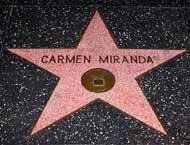
#Carmen Miranda#The Brazilian Bombshell#Brazilian Bombshell#Samba#Chiquita Banana#Cantora Do It#Ditadora Risonha do Samba#A Pequena Notável#Silent Films#Golden Age of Hollywood#Film Classics#Old Hollywood#Vintage Hollywood#Hollywood#Hollywood Walk of Fame#Walk of Fame#Movie Legends#movie stars#1900s#28 Hollywood Legends Born in the 1900s
41 notes
·
View notes
Text
Jester Hairston
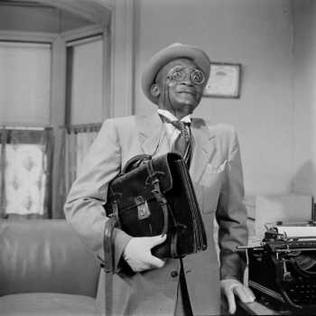
By Life Magazine via Google Images-Photographer Loomis Dean., Fair use, https://en.wikipedia.org/w/index.php?curid=28896923
Jester Joseph Hairston (July 9, 1901 – January 18, 2000) was an American composer, songwriter, arranger, choral conductor and actor. He was regarded as a leading expert on black spirituals and choral music. His notable compositions include "Amen," a gospel-tinged theme from the film Lilies of the Field and a 1964 hit for the Impressions, and the Christmas song "Mary's Boy Child."
Hairston was born in Belews Creek, a rural community on the border of Stokes, Forsyth, Rockingham and Guilford counties in North Carolina. His grandparents had been slaves. At an early age, he and his family moved to Homestead, Pennsylvania, just outside Pittsburgh, where he graduated from high school in 1921. Hairston was very young when his father was killed in a job-related accident. Hairston was raised by his grandmother while his mother worked. Hairston heard his grandmother and her friends talking and singing about plantation life and became determined to preserve this history through music.
Hairston initially majored in landscape architecture at Massachusetts Agricultural College in the 1920s. He became involved in various church choirs and choral groups, and accompanist Anna Laura Kidder saw his potential and became his benefactor. Kidder offered Hairston financial assistance to study music at Tufts University. from which he graduated in 1929. He was one of the first black students admitted to Tufts. Later he studied music at the Juilliard School.
Hairston pledged the Chi chapter of the Kappa Alpha Psi fraternity in 1925. He worked as a choir conductor in the early stages of his career. His work with choirs on Broadway eventually led to singing and acting parts in plays, films, radio programs and television shows.
Hairston sang with the Hall Johnson Choir in Harlem for a time but was nearly fired from the all-black choir because he had difficulty with the rural dialects that were used in some of the songs. He had to shed his Boston accent and relearn the country speech of his parents and grandparents. Johnson had told him: "We're singing ain't and cain't and you're singing shahn't and cahn't and they don't mix in a spiritual." The choir performed in many Broadway shows, including The Green Pastures. In 1936, the choir was asked to visit Hollywood to sing for the film The Green Pastures. Russian composer Dimitri Tiomkin heard Hairston and invited him to what would become a 30-year collaboration in which Hairston arranged and collected music for films. In 1939, Hairston married Margaret Swanigan. He wrote and arranged spirituals for Hollywood films as well as for high school and college choirs around the country.
Hairston wrote the song "Mary's Boy Child" in 1956. He also arranged the song "Amen", which he dubbed for the Sidney Poitier film Lilies of the Field, and arranged traditional Negro spirituals.[16] Most of Hairston's film work was in the field of composing, arranging and choral conducting. He also acted in more than 20 films, mostly in small roles, some uncredited. Hairston starred in John Wayne's The Alamo (1960), in which he portrayed "Jethro," a slave owned by Jim Bowie. In 1962’s To Kill a Mockingbird Hairston portrayed the uncredited role of the father of accused rapist Tom Robinson. In 1967’s In the Heat of the Night, Hairston portrayed the butler of a wealthy racist being investigated for murder. In both films, Hairston shot scenes along side men who won an Academy Award for Best Actor in those respective films for portraying white Southerners navigating their jobs through a racially divided culture.
In 1961, the U.S. State Department appointed Hairston as Goodwill Ambassador. He traveled all over the world teaching and performing the folk music of the slaves. In the 1960s, he held choral festivals with public high-school choirs, introducing them to Negro spiritual music, and sometimes led several hundred students in community performances. His banter about the history of the songs along with his engaging personality and sense of humor endeared him to many students.
During his nationwide travels, Hairston checked local phone books for other Hairstons and reunited many people on his family tree, both black and white. He composed more than 300 spirituals. He was the recipient of many honorary doctorates, including a doctorate from the University of Massachusetts in 1972 and a doctorate in music from Tufts in 1977.
In his later years, Hairston served as a cultural ambassador for American music, traveling to numerous countries with choral groups that he had assembled. In 1985, he took the Jester Hairston Chorale, a multiracial group, to sing in China at a time when foreign visitors would rarely appear there.
Hairston died in Los Angeles of natural causes in 2000 at age 98. For his contribution to the television industry, Hairston has a star on the Hollywood Walk of Fame located at 6201 Hollywood Boulevard. He is interred at Inglewood Park Cemetery, Inglewood, California.
33 notes
·
View notes
Text
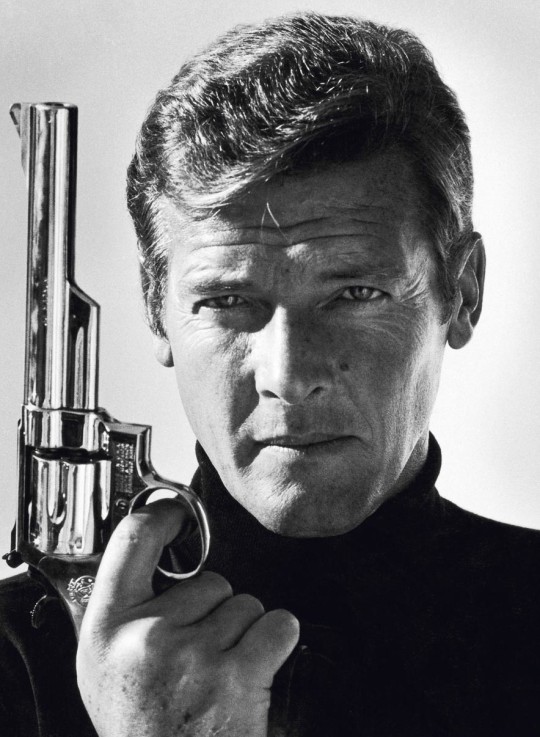
Sir Roger George Moore,
KBE (14 October 1927 – 23 May 2017) was an English actor. He was the third actor to portray fictional secret agent James Bond in the Eon Productions/MGM Studios film series, playing the character in seven feature films: Live and Let Die (1973), The Man with the Golden Gun (1974), The Spy Who Loved Me (1977), Moonraker (1979), For Your Eyes Only (1981), Octopussy (1983), and A View to a Kill (1985). Moore's seven appearances as Bond are the most of any actor in the Eon-produced entries.
On television, Moore played the lead role of Simon Templar, the title character in the British mystery thriller series The Saint (1962–1969). He also had roles in American series, including Beau Maverick on the Western Maverick (1960–1961), in which he replaced James Garner as the lead, and a co-lead, with Tony Curtis, in the action-comedy The Persuaders! (1971–1972). Continuing to act on screen in the decades after his retirement from the Bond franchise, Moore's final appearance was in a pilot for a new Saint series that became a 2017 television film.
Moore was appointed a UNICEF Goodwill Ambassador in 1991 and was knighted by Queen Elizabeth II in 2003 for services to charity. In 2007, he received a star on the Hollywood Walk of Fame for his contributions to the film industry. He was made a Commander of the Order of Arts and Letters by the French government in 2008.
Moore was appointed Commander of the Order of the British Empire (CBE) in the 1999 New Year Honours and was promoted to Knight Commander of the Order of the British Empire (KBE) in the 2003 Birthday Honours for charitable services, especially UNICEF and latterly Kiwanis International, which had dominated his public life for more than a decade. On being knighted, Moore said that the citation "meant far more to me than if I had got it for acting... I was proud because I received it on behalf of UNICEF as a whole and for all it has achieved over the years".
On 11 October 2007, three days before he turned 80, Moore was awarded a star on the Hollywood Walk of Fame for his work on television and in film. Attending the ceremony were family, friends, and Richard Kiel, with whom he had acted in The Spy Who Loved Me and Moonraker. Moore's star was the 2,350th star installed, and is appropriately located at 7007 Hollywood Boulevard.
On 28 October 2008, the French government appointed Moore a Commander of the Ordre des Arts et des Lettres. On 21 November 2012, Moore was awarded an honorary doctorate from the University of Hertfordshire for his outstanding contributions to the UK film and television industry for over 50 years, in particular film and television productions in Hertfordshire.
After his death, the Roger Moore Stage was opened at Pinewood Studios at a ceremony held in October 2017 to celebrate his life and work. His wife and family were in attendance along with Bond producers Michael G Wilson and Barbara Broccoli, and guests at the event included Joan Collins, Michael Caine, Stephen Fry, Tim Rice and Stefanie Powers.
In the 2018 film My Dinner with Hervé, Moore was portrayed by actor Mark Umbers.
Moore became a tax exile from the United Kingdom in 1978, originally to Switzerland, and divided his year between his four homes: an apartment in Monte Carlo, a holiday house in the coastal Tuscan town of Castiglione della Pescaia, a chalet in Crans-Montana, Switzerland, and a home in Saint-Paul-de-Vence, France. Moore became a resident of Monaco, having been appointed a Goodwill Ambassador of Monaco by Prince Albert II for his efforts in internationally promoting and publicising the principality. Moore was scathing of the Russian population in Monaco, saying, "I'm afraid we're overstuffed with Russians. All the restaurant menus are in Russian now."
Moore was vocal in his defence of his tax exile status, saying that in the 1970s, with taxes levied on top earners under the Labour government of James Callaghan, he had been urged by his "accountants, agents, and lawyers" to move abroad because, "At that point we were taxed up to 98% on unearned income, so you would never be able to save enough to ensure that you had any sort of livelihood if you didn't work." Moore said in 2011 that his decision to live abroad was "not about tax. That's a serious part of it. I come back to England often enough not to miss it, to see the changes, to find some of the changes good...I paid my taxes at the time that I was earning a decent income, so I've paid my due".
✔ Roger Moore is contentiously credited with inspiring the Walls Magnum ice cream. In the 1960s, he reportedly said that his one wish would be for a choc ice on a stick. Walls created this product and sent one to Moore. They later launched the Magnum in 1989, which is now the world's top-selling ice cream brand.
Daily inspiration. Discover more photos at Just for Books…?
11 notes
·
View notes
Text

Michaela Mabinty DePrince (Mabinty Bangura; January 6, 1995 – September 10, 2024) was a ballet dancer, currently dancing with the Boston Ballet. She rose to fame after starring in the documentary First Position in 2011, following her and other young ballet dancers as they prepared to compete at the Youth America Grand Prix. With her adoptive mother, Elaine DePrince, she authored the book Taking Flight: From War Orphan to Star Ballerina. She danced with the Dance Theatre of Harlem as the youngest dancer in the history of the company and was a former soloist with the Dutch National Ballet. She was a goodwill ambassador with the Dutch organization War Child, based in Amsterdam.
Born into a Muslim family, she grew up as an orphan in Sierra Leone after her uncle brought her to an orphanage during the civil war. Her adoptive parents were told that her father was shot and killed by the Revolutionary United Front when she was three years old and that her mother starved to death soon after.
In 1999, she and another girl were adopted by Elaine and Charles DePrince, a couple from Cherry Hill, New Jersey, and taken to the US.
She trained as a ballet dancer, performing at the Youth America Grand Prix among other competitions. She trained in classical ballet at The Rock School for Dance Education in Philadelphia. Concurrent with intense ballet training, she took online classes through Keystone National High School, where she earned her high school diploma. She graduated from the American Ballet Theatre’s Jacqueline Kennedy Onassis School in New York. Her professional debut performance was in the role of Gulnare in Mzansi Productions and the South African Ballet Theatre’s premiere of Le Corsaire on July 19, 2012.
In 2015 MGM acquired the film rights to her book Taking Flight: From War Orphan to Star Ballerina. In 2018 MGM announced that Madonna will direct Taking Flight, a biopic on her life and career.
In 2021, she joined the Boston Ballet as a second soloist. She danced the leading role in Coppelia. #africanhistory365 #africanexcellence
6 notes
·
View notes
Text
Audrey Hepburn (May 4, 1929–January 20, 1993). A legend in the film industry with Oscar, Tony, Grammy, and Emmy wins, in addition to a fashion icon and UNICEF Goodwill Ambassador. With her effective and proficient acting skills, she was ranked the 3rd greatest female screen legend by the American Film Institute in 1999. Hepburn was the embodiment of stylishness, beauty, sophistication, and charm. 📖📝🎞️

#movies#film#1940s#audrey hepburn#1950s#1960s#1970s#1980s#unicef#oscars#fashion#tony awards#emmys#grammys
51 notes
·
View notes
Text
Happy Birthday 🎂 🥳 🎉 🎈 🎁 🎊 To You
The Most Interesting & Intriguing Black 👩🏿 American ⚫ Actress 🤎 Of Television & Tv Movies Of Many Genres
Born On September 5th, 1989
Graham was born in Geneva, Switzerland, and raised in Los Angeles, California, United States. Her father, Joseph, is of Americo-Liberian descent, and her mother, Natasha, is Jewish (from a family from Poland and Russia). Graham's father was a music executive and the godfather of two of producer Quincy Jones' children. Her paternal grandfather was a UN Ambassador, serving for 40 years in the Netherlands, Sweden, Romania, and Kenya. Graham disclosed in an interview that her father left the music industry to work as a journalist under his father for the UN. Her maternal and paternal grandparents were refugees from the Holocaust and Liberia, and she credits them as an inspiration for her work as a Goodwill Ambassador for UNHCR.
She is an American actress, singer, dancer, and activist. She played Bonnie Bennett on The CW supernatural drama series The Vampire Diaries (2009–2017). Her film credits include The Parent Trap (1998), 17 Again (2009), The Roommate (2011), Honey 2 (2011), Addicted (2014), and All Eyez on Me (2017). In music, Graham has released two extended plays and four studio albums.
In 2017, she played actress Jada Pinkett Smith in the Tupac biopic All Eyez on Me.
Graham starred in the Netflix romantic comedy films The Holiday Calendar (2018), Operation Christmas Drop (2020), and Love in the Villa (2022). She has also appeared in the 2018 apocalyptic thriller How It Ends. Graham is set to play singer and actress Diana Ross in the 2025 Michael Jackson biopic Michael.
Please Wish This Young & Dazzling Influential Multi Talented Black Mixed American Actress, Singer, Dancer, and Activist. A Very Happy Birthday 🎂 🥳 🎉 🎈 🎁 🎊
You Seen Her Act & Dance in Movies like Honey 2 & All Eyez On Me
You watched her Be Phenomenal in The CW'S 1# Supernatural Drama Series, The Vampire Diaries 🧛♂️ 🧛♀️
& She Has The Voice Of A Radiant Angel 😇 ✨
The 1 & The Only
MS. KATERINA ALEXANDRE HARTFORD GRAHAM AKA KAT GRAHAM 👩🏿🤎🖤 Kat Graham
HAPPY 35TH BIRTHDAY 🎂 🥳 🎉 🎈 🎁 🎊
TO YOU MS. GRAHAM 👩🏿🤎🖤 & HERE'S TO MANY MORE YEARS TO COME






#KatGraham #TheVampireDiaries #Honey2 #AllEyezOnMe #HowItAllEnds #TheHolidayCalendar #OperationChristmasDrop #LoveInTheVilla #BonnieBennett
#Kat Graham#the vampire diaries#Honey 2#All Eyez On Me#how it all ends#The Holiday Calendar#Operation Christmas Drop#Love In The Villa#Bonnie Bennett#Spotify
9 notes
·
View notes
Text
American George Glezmann, Held by the Taliban for More than Two Years Under Joe Biden, Freed Under President Trump | The Gateway Pundit | by Margaret Flavin
🙏GOD BLESS PRESIDENT TRUMP, HE REALLY CARE FOR US AND OUR COUNTRY ❤️🇺🇸
✅George Glezmann, 66, an American Citizen, Delta Airlines Mechanic Held by the Taliban FOR MORE THAN TWO YEARS UNDER JOE BIDEN, 👉FREED UNDER PRESIDENT TRUMP🇺🇸 on Thursday
✅NO ONE WAS RELEASED IN EXCHANGE for Glezmann
✅Former US Ambassador to Afghanistan Zalmay Khalilzad with US hostage envoy Adam Boehler to Kabul to bring Glezmann home
✅“@realDonaldTrump has made the FREEDOM and homecoming of Americans held abroad A HIGH PRIORITY. It is an honor to assist in this important effort”
✅"The Taliban government agreed to free him as a GOODWILL GESTURE to
@POTUSand the American people” ...
2 notes
·
View notes
Text
Danai Gurira - The Activist

Award winning playwright and actress Gurira holds a Master of Fine Arts from Tisch, NYU and serves as an ambassador for an array of organisations:
Almasi Arts
Co-Founder

UN Goodwill Ambassador

Love Our Girls
Founder
instagram
Global Citizen
Supporter since 2016
youtube
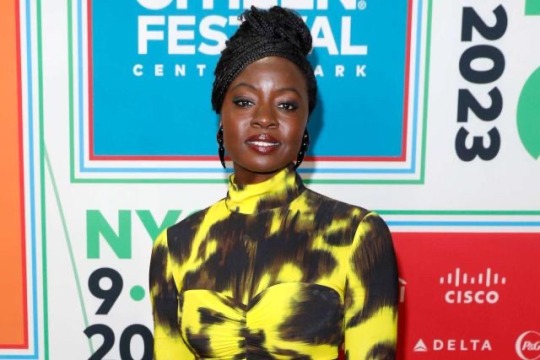

PETA
With her dog Papi

WildAid Ambassador for Elephants

instagram
And many more admirable causes from environmental, voting and civil rights, women and young children, arts and more

2023


2016 & 2017
🧡
#Danai Gurira#activist#actress#writer#producer#creator#Michonne#Okoye#TWD#TOWL#black panther#the walking dead#the ones who live#richonne
12 notes
·
View notes
Text
By: Julian Adorney, Mark Johnson and Geoff Laughton
Published: Jan 18, 2025
Unlike the Civil Rights Movement, which chose sympathetic figures like Rosa Parks, SJFs have lionized individuals whose actions repel most Americans.
Social Justice Fundamentalism (SJF) is doomed.
How can we say this so confidently? And why do we believe that SJF ideology will meet its demise relatively quickly now that the tide is beginning to turn?
For one thing, in their zeal to oppose the out-group that they deem responsible for all oppression, many SJFs have adopted an anything-goes mentality. Threats and violence are justified, they claim, as long as they target the “correct” people. This creates truly terrible brand ambassadors. For example, SJFs have lionized Luigi Mangione, the man suspected of killing UnitedHealthcare CEO Brian Thompson with one post on X garnering over 36,000 likes that compared him to Nelson Mandela, stating, “They called Nelson Mandela a ‘terrorist’ too, Luigi. You’re in good company.” Similarly, many SJFs leaped to defend Christian Cooper, the black man a white woman reported to the police in 2020, even after evidence emerged that he had threatened her and her dog. Furthermore, following Hamas’ October 7 attack on Israeli civilians, a survey showed that 51 percent of respondents aged 18-24 believed that “the Hamas killing of 1200 Israeli civilians in Israel can be justified by the grievances of Palestinians.”
Contrast this with the Civil Rights Movement. When Martin Luther King Jr. and his allies opposed the Montgomery Bus Boycott, they chose Rosa Parks as a brand ambassador. Why? It wasn’t because Parks was the first black person to refuse to sit in the back of the bus. It was because she was a woman of noble character with a flawless background. Civil rights protestors, aware of the uphill battle they faced against a prejudiced nation, needed an ambassador whose plight would evoke sympathy in the hearts of fellow Americans. If a woman like this could be arrested under Jim Crow, the nation must be encouraged to reconsider the justice of segregation.
But there’s nothing sympathetic about Mangione or Cooper. There is nothing sympathetic about killing a husband and father in cold blood, simply because he was the CEO of an unpopular company; or about a man telling a woman out walking her dog that he would do “something” to her and her dog that “she was not going to like.” There is nothing sympathetic about the brutal rapes and murders of teenaged civilians that characterized Hamas’ October 7 attack. When SJFs prop up these characters and act as if their threats and violence are heroic, they lose the goodwill of most decent Americans. There’s a reason that the far-left’s rabid anti-Semitism in the wake of Hamas’ attack turned so many Democrats and progressives away from SJF.
However, it’s not just that so many SJFs endorse an anything-goes mentality against their so-called enemies. It’s also that, sooner or later, everyone becomes an enemy. In the wake of the #MeToo movement, “Believe all women” became a popular slogan. That is, until 2020, when a few women were accused of racism for calling the police on black men (with some justification, in many cases). Then “Believe all women” shifted to “white women need to shut their mouths and stop lying!” Black men were celebrated on the left until it came out that many didn’t support Kamala Harris, at which point they were accused of being “white-adjacent” (by MSNBC’s Joy Reid) and sexist (by Barack Obama). Even sexual assault survivors and progressive transwomen are getting pilloried for failing to support SJF ideology. For many too-online SJFs, nothing short of absolute obedience to the party line will suffice. This is self-destructive even in the best of times, but it becomes downright political suicide when the party line is also constantly shifting.
We've seen this throughout history: common-enemy identity politics collapse in part because such movements inevitably eat their own. During the Cultural Revolution in China, Mao’s Red Guards were initially unified in attacking the targets that Mao assigned them (the bourgeoisie and the “Four olds”). But Xi Van Fleet, a commentator who lived through the revolution, explains how at a certain point the Red Guards “start[ed] to fight each other.” They had dismantled their other enemies, leaving a power vacuum; and so they started forming into factions to seek their own power. The resultant violence, as factions of Red Guards attacked each other, was awful: Van Fleet compares it to a “civil war.” Nor was the infighting relegated to just the Red Guards. Mao had created and unleashed them, but at a certain point, Van Fleet says, he decided to get rid of them. He “killed tens of thousands of Red Guards,” and then exiled their leaders to the countryside for hard physical labor. The revolution wasn’t destroyed by violence from without; it consumed itself in an orgy of internal violence that no-one could forget.
Most SJFs lack the brutality and desire for violence that characterized the Red Guard. However, the lesson is the same: because common-enemy identity politics requires an out-group to unite against, its members will eventually turn on one another, transforming former allies into the new out-group.
As a result, many SJFs struggle to form stable coalitions. In 2022, The Intercept published a long story about why progressive organizations were spending all their time and energy gripped by internal turmoil instead of successfully mobilizing and fighting for legislative change. The scope of the problem the authors documented was enormous:
…the progressive advocacy space across the board…has, more or less, effectively ceased to function. The Sierra Club, Demos, the American Civil Liberties Union, Color of Change, the Movement for Black Lives, Human Rights Campaign, Time’s Up, the Sunrise Movement, and many other organizations have seen wrenching and debilitating turmoil in the past couple years.
Part of the problem, the authors argued, was that bad-faith actors were using the “language of social justice” to “smuggle through standard grievances” about the workplace, such as wanting more time off and easier schedules. However, much of the turmoil that gripped these institutions came in the form of circular firing squads: unless the organization was perfectly representative and lived out every tenet of SJF completely, it shouldn’t be allowed to function. “If your reproductive justice organization isn’t Black and brown it’s white supremacy in heels co-opting a WOC movement,” read a typical message.
To illustrate what this looks like, consider the case of Dr. Lindo Bacon. Bacon is an SJF nutritionist who published a (deeply-flawed) book called Health At Every Size (which we reviewed here). Despite its scholastic shortcomings, Bacon’s book became a bestseller and put the Health at Every Size movement and the Association For Size Diversity and Health (ASDAH) on the map.
However, when Bacon proposed publishing a 15th anniversary version of his book to bring more visibility to the cause, ASDAH leaders rebuked him. They suggested that instead of publishing a 15th anniversary edition, Bacon should let his book go out of print “so that new voices who are deeply impacted by fat hatred could be ushered in.” They lectured him about his privilege and urged him to consider “passing this opportunity along to any of the fat, BIPOC, disabled, lower socioeconomic status, etc folks who are doing this work and whose voices need to be centered and uplifted.” If he refused their suggestions, they warned, he would be “perpetuating harm by centering the experience and perspective of a relatively affluent, thin/straight-sized, white person.” Following further exchanges, ASDAH cut ties with Bacon explosively, instructed him not to write or publish an updated version of his book, and then published the entire email exchange in a blog titled “Holding Lindo Bacon Accountable for Repeated Harm in the Fat Liberation & HAES® Communities.” It makes for a truly remarkable read, illustrating why many SJFs struggle to form coalitions: because everyone possesses some kind of privilege, individuals and groups can engage in severe conflicts under the guise of addressing privilege and advocating for social justice.
(Of course, not every SJF behaves this way, and many genuinely desire to collaborate in pursuit of a more inclusive society. However, what happened to Bacon is not uncommon. As a movement, SJFs experience a disproportionately high amount of infighting).
This leads to the final reason that SJF is likely doomed: the unpopularity of its ideas.
Many of SJF’s biggest causes remain deeply unpopular with the American people. For instance, many SJFs consider Hamas’ October 7 attack on Israel as justified, but most Americans disagree. A 2024 Pew survey found that 66 percent of respondents considered “the way Hamas carried out the Oct. 7 attack” to be “completely unacceptable,” compared to just 2 percent who found it “completely acceptable.” Another foundational cause of this ideology—defunding the police—also lacks mainstream support. In 2021, three times as many Americans wanted increased police funding (46 percent) compared to those who wanted it decreased (15 percent). Similarly, on transgender issues, 68 percent of adults opposed giving puberty-blocking medications to so-called “transgender children” aged 10-14, and over 60 percent of Americans believed that transgender women should not be allowed to participate in women’s sports. The term “LatinX,” is found offensive by 40 percent of Hispanics and is used by only 2 percent. On issue after issue, SJF ideas and policy positions are wildly unpopular.
But the problem isn’t just that many SJF ideas are unpopular; after all, previously unpopular ideas like gay marriage and the civil rights movement have become mainstream. The real issue is that many SJFs fundamentally reject the idea that they can—or should—persuade their fellow Americans of the merits of their ideas. For many SJFs, the rest of us are viewed as irredeemably prejudiced or as oppressors, incapable of being reasoned with. If we’re white, they claim, we oppose SJF ideas to preserve our privilege; if we’re black or brown, we do so due to “internalized oppression.” In either case, our criticism doesn’t really count because, according to SJF scholars, our criticisms are not coming from a sincere place.
In lieu of persuasion, many SJFs have tried to guilt, browbeat, and shame the rest of us into adopting their ideas. The problem, from a marketing standpoint, is that this only works in the short term. Initially, being labeled a racist might lead someone to feel remorseful and ask the SJF insulting them what they can do better. But by the tenth time that the charge is leveled—especially when directed at minorities who don’t toe the SJF line—it loses its sting. You can only bully people for so long before they stop putting up with it.
An already unpopular ideology that depends on guilt and coercion rather than persuasion is likely to become increasingly unpopular over time.
So, if SJF is on the decline, what should we do?
Firstly, we must continue fighting to expose the broken ideas at the heart of SJF ideology. SJF ideology might be doomed, but it can still do a lot of damage in the meantime; therefore, we should work to shorten its lifespan. The Cultural Revolution only lasted 10 years, but in that time it wreaked immense havoc. Had critics been willing and able to stand up and speak against the revolution so that it ended in five years instead of 10, they could have saved many lives.
We should also advocate explicitly for common-humanity identity politics, as aptly described by Pauli Murray in 1945: “When my brothers try to draw a circle to exclude me, I shall draw a larger circle to include them.” There’s a real danger any time a destructive ideology begins to lose its power: those of us harmed by it might seize control and try to punish its followers. This can feel like justice, but in practice it’s just vengeance. We end up directing our anger not at those who wronged us but at anyone associated with the same group as those who wronged us. This perpetuates an endless cycle of tit-for-tat retaliation.
Instead of turning the tables, those of us who oppose SJF ideology should rise above. We should offer the hand of fellowship and brotherhood to the SJFs we know. Many have noble intentions and an ability to see forms of prejudice that society has historically turned a blind eye to. Where these insights align with common-humanity identity politics, we should welcome them.
SJF ideology is on its way out because the most toxic components of the ideology are also the least palatable to ordinary Americans. That’s good news. Now is not the time to beat those who subscribe to SJF ideology; it’s the time to win them.
#Julian Adorney#Mark Johnson#Geoff Laughton#social justice fundamentalism#social justice#critical social justice#fundamentalism#defund the police#Latinx#hamas supporters#israel#palestine#Hamas terrorism#liberalism#liberal ethics#liberal values#classical liberalism#guilt#coercion#cancel culture#internalized oppression#privilege#woke#wokeness#cult of woke#wokeism#wokeness as religion#religion is a mental illness
4 notes
·
View notes
Text
Presidential Medal of Freedom recipients
José Andrés Bono Ashton Baldwin Carter (posthumous) Hillary Rodham Clinton Michael J. Fox Tim Gill Jane Goodall Fannie Lou Hamer (posthumous) Earvin "Magic" Johnson Robert Francis Kennedy (posthumous) Ralph Lauren Lionel Messi William Sanford Nye George W. Romney (posthumous) David M. Rubenstein George Soros George Stevens, Jr. Denzel Washington Anna Wintour
Spanish American chef José Andrés’ World Central Kitchen charity has become one of the world's most recognized food relief organizations.
Bono is the frontman for rock band U2 and a pioneering activist against AIDS and poverty.
Ash Carter served as the 25th Secretary of Defense under 11 Secretaries of Defense in both Democratic and Republican administrations.
Hillary Rodham Clinton has a long career in public service, including being the first First Lady elected to the United States Senate, serving as Secretary of State, and becoming the first woman nominated for president by a major United States political party.
Actor Michael J. Fox is a world-renowned advocate for Parkinson’s disease research and development.
Tim Gill is an entrepreneur and LGBTQ+ activist.
Conservationist Jane Goodall’s research transformed our understanding of primates and human evolution.
Fannie Lou Hamer founded the Mississippi Freedom Democratic Party and laid the groundwork for the 1965 Voting Rights Act.
Off the court, athlete Earvin "Magic" Johnson is an entrepreneur and philanthropist who supports underserved communities through his Magic Johnson Foundation.
Robert Francis Kennedy is remembered as an Attorney General and as a United States Senator who sought to address poverty and inequality in the country.
American fashion designer Ralph Lauren has influenced culture, business, and philanthropy.
Off the field, soccer athlete Lionel Messi supports healthcare and education programs for children around the world through the Leo Messi Foundation and serves as a UNICEF Goodwill Ambassador.
Bill Nye has inspired and influenced generations of American students as "Bill Nye the Science Guy" and continues to advocate for space exploration and environmental stewardship.
George W. Romney served as both a Michigan governor and secretary of housing and urban development.
David Rubenstein is the co-founder of The Carlyle Group global investment firm.
Democratic philanthropist George Soros’ network of foundations focus on a variety of global initiatives.
George Stevens, Jr. is an award-winning writer, director, author, and playwright, and founded the American Film Institute.
Actor, director and producer Denzel Washington has also served as National Spokesman for the Boys & Girls Clubs of America for over 25 years.
Renowned fashion icon Anna Wintour is a champion for philanthropic causes.
3 notes
·
View notes
Text
Charles de Gaulle found the memory of D-Day so painful that he refused to participate in commemorations of the Normandy invasion during his 11 years as president of France. He did not invite heads of government to mark either the 20th anniversary in 1964 or the 25th in 1969. Old soldiers saluted; ambassadors laid wreaths.
President Dwight Eisenhower had tried to salve the French hurt in the statement he released for the 10th anniversary in 1954. The statement did not mention the United States or its armed forces. It praised by name three British commanders, three French, one Soviet—no Americans. It credited the victory to “the joint labors of cooperating nations,” and said “it depended for its success upon the skill, determination and self-sacrifice of men from several lands.” You might want to read it as a prophylactic antidote to the boast and bombast likely to fill the air today.
The experience of liberation was a complex thing for almost every country that experienced it from 1943 to 1945, but perhaps nowhere more than France. In the American imagination of 1944, France exists as a throng of cheering, welcoming faces, as women kissing GIs, as a landscape through which Allied tanks and trucks roar on their way to Germany. Depending on our mood, we romanticize the Resistance or excoriate collaborators—seldom caring to remember how ambiguously collaboration and resistance often blended together, or how often collaborators and resisters were the same people at different phases of the war or even different times of the same day.
To be liberated, first you must be defeated.
Everything about these D-Day anniversaries reminds the French of that humiliating sequence. When de Gaulle landed in Normandy for a one-day visit on June 14, he traveled back-and-forth across the English Channel in a British warship. De Gaulle’s ability to establish a provisional government depended on the permission of U.S. and British authorities—and so, ultimately, would the even more fraught question whether France would be accepted again as a major ally.
For four years, Vichy France had supplied and aided Germany. Vichy planes had bombed Gibraltar in 1940; Vichy tax collectors had extracted resources to pay the German occupiers. When Italy changed sides in 1943, it was treated as a liberated nation—but it was not accepted as a co-belligerent. France’s post-D-Day status utterly depended on British and American goodwill. For a man like de Gaulle, that dependency rankled.
De Gaulle’s famous speech of August 25, 1944, after the liberation of Paris, starkly reveals the fictions that would restore French pride.
“Paris! Paris outraged! Paris broken! Paris martyred! But Paris liberated! Liberated by itself, liberated by its people with the help of the French armies, with the support and the help of all France, of the France that fights, of the only France, of the real France, of the eternal France! … It will not even be enough that we have, with the help of our dear and admirable Allies, chased him from our home for us to consider ourselves satisfied after what has happened. We want to enter his territory as is fitting, as victors.”
France did enter Germany as a victor. French armies, supplied by the United States, subordinate to U.S. command, were stood up in 1944–45. France was allotted an occupation zone in Germany and awarded a permanent seat on the UN Security Council. (Italy was not even invited to join the United Nations until 1955.) Allied officialdom agreed to believe de Gaulle’s story that the France that fought Nazi Germany was the only real France.
But everyone understood the story was not true. The French military defeat in 1940 had torn apart social wounds dating back decades and longer. Conservative and Catholic France reinterpreted the battles of 1940 as a debacle only of the liberal and secular France that had held the upper hand since the founding of the Third Republic in 1871 and especially since the Dreyfus affair that began in 1894. When the reactionary French writer Charles Maurras was sentenced to life imprisonment for collaboration, he supposedly replied, “It’s the revenge of Dreyfus.”
Most French business leaders and civil servants collaborated out of opportunism or necessity. The Germans held hundreds of thousands of captured French soldiers as hostages for years after 1940. But more than a few leading French people, including many intellectuals and churchmen, collaborated out of a species of conviction. A French cardinal led the recruitment of French volunteers to fight alongside the Germans in Russia in 1941. “How can I, in a moment so decisive, refuse to approve the common noble enterprise directed by Germany, dedicated to liberate Russia from the bonds that have held it for the last twenty-five years, suffocating its old human and Christian traditions, to free France, Europe, and the world from the most pernicious and most sanguinary monster that mankind has ever known, to raise the peoples above their narrow interests, and to establish among them a holy fraternity revived from the time of the Christian Middle Ages?” Cardinal Alfred Baudrillart wrote, in his endorsement of the Anti-Bolshevik Legion.
The loss of the war against Germany enabled such people to launch a much more congenial culture war at home, to purge France of “liberty, equality, and fraternity,” the slogan of 1789, and establish in its place “work, family, fatherland,” the slogan of Vichy. Since 1905, France had been defined as a secular state. The Catholic Church had been reduced to one sect among others: Protestant, Jewish, even Muslim. (In 1920, the French government had subsidized the building of a grand mosque in thanks for the First World War service of Muslim troops. The great military cemetery near Verdun has a special section for Muslim soldiers, their graves angled away from the others in order to face Mecca.)
Vichy put an end to all that. The defeat of France by Germany was ideologically reinterpreted as a victory of “deep France” over a shallow liberal metropolitan veneer. Subjugation was reinterpreted by Vichy ideologues as redemption. Enmity was shifted from the occupying Germans to the liberal commercial “Anglo-Saxons.” Vichy propagandists produced cartoons in which Mickey Mouse, Donald Duck, and Popeye were depicted dropping bombs on France at the behest of Jewish masters.
Anti-Allied enmity was not difficult to stoke: Allied bombing before 1944 and Allied land forces after 1944 did more damage to French cities than the Germans had in the few weeks of combat in 1940. The port of Le Havre was bombed 132 times from 1940 to 1944. The final raids in September reduced the city center to rubble, killing 5,000, maiming and rendering homeless tens of thousands more. The modernist cityscape that replaced the former 18th- and 19th-century core remains an enduring monument to the price paid by the French people for their liberation.
Vichyite enthusiasm for anti-liberalism opened a strange fluidity in French politics during and after the war. The future leader of French socialism, François Mitterrand, began his political career on the far right of French politics and worked until 1943 as a civil servant in the Vichy government. As president after 1981, Mitterrand would raise minimum wages, cut the workweek to 39 hours, nationalize some financial institutions, and end the death penalty. He would even do what de Gaulle could never stomach: celebrate the D-Day anniversary.
It was Mitterrand who decided to invite Ronald Reagan to Normandy in 1984, where Reagan delivered one of the great speeches of his presidency. Yet Mitterrand, to the end of his career, remained friends with—and protected from prosecution for crimes against humanity—the Vichy police chief who deported tens of thousands of Jews to their death.
But the chief was not the only one protected, and Mitterrand was not the only protector. As the French journalist René Rémond quipped to Roger Cohen of The New York Times: “They all have something to hide.”
When Americans choose to remember this sad history, they do so from the privilege of an easier geography. As time has separated us from the Second World War, U.S. memories have become more triumphalist and self-aggrandizing. It is a remarkable thing to watch President Donald Trump’s preening and posing in the U.K. and France on this anniversary. France fell in 1940 in great part because the United States went AWOL from European peace and security after 1919. The U.S. was AWOL very much because of leaders who in their day espoused the same crass protectionism and isolationism—and even the same “America First” slogan—as Trump himself. . .
6 notes
·
View notes
Text
1. Thoughts on the Evolution of Pop Cultural Depictions of Supernatural Powers in Young Women

The evolution of supernatural powers in young women’s pop culture shows a remarkable shift from constrained, often comedic portrayals to powerful, layered characters. Early depictions in Bewitched and I Dream of Jeannie showed magical abilities as something to hide or humorously mismanage, reinforcing traditional gender roles. However, the 1990s introduced more empowered characters like Buffy the Vampire Slayer, who balanced everyday teenage struggles with fighting supernatural threats, reflecting a shift toward portraying young women as relatable and resilient. Today’s characters, such as Eleven in Stranger Things and Wednesday Addams, further this theme by emphasizing autonomy, strength, and social awareness. These portrayals have inspired viewers to embrace personal power, resilience, and authenticity, mirroring cultural changes in women’s empowerment and the broader acceptance of diverse narratives in media.
2. Magical Powers and Their Connection to Adolescence

Magical powers in young female characters often serve as a metaphor for the tumultuous changes of adolescence. This connection captures the emotional intensity, newfound independence, and struggle for self-control typical of teenage years. For instance, Sabrina Spellman’s journey of balancing her human and witch sides parallels real-life adolescent identity crises, where one seeks to fit in yet yearns to assert individuality. Similarly, Eleven’s powers in Stranger Things symbolize her strength and vulnerability, illustrating the need for self-discovery amid unfamiliar challenges. These characters show that adolescence is a time to confront, harness, and grow into one’s unique traits, making them highly relatable to young audiences grappling with the same life transitions.
3. Impact of Magical Power Depictions on Real Girls and Young Women

The portrayal of young women with magical powers offers a powerful message of agency and self-confidence to real-life audiences. By seeing characters like Hermione Granger, who uses intelligence and courage to overcome obstacles, or Buffy, who fights literal demons, girls and young women are encouraged to view themselves as capable of facing their challenges. These characters’ struggles also resonate with today’s context of social activism, where young women are increasingly stepping into leadership roles to effect change. The empowerment in these portrayals validates the strength and significance of young voices, inspiring viewers to assert their capabilities, whether in activism, personal challenges, or professional aspirations.
4. Additional Girl Icons with Magical Powers

Beyond the well-known icons, characters like Kamala Khan from Ms. Marvel and Rey from Star Wars represent newer takes on magical and superhero abilities with crucial cultural diversity. As the first Muslim-American superhero in mainstream comics, Kamala Khan challenges stereotypes. She brings fresh representation to the superhero genre, showing young women of all backgrounds that they can be powerful and unique. As the central hero of the Star Wars sequel trilogy, Rey carries forward the Jedi legacy in a way that acknowledges and builds upon past heroines like Princess Leia. These characters broaden the scope of empowered girl icons, emphasizing that personal strength and courage come from diverse stories and perspectives.
5. Leadership Evolution of Actors Who Played These Icons

Many actors who portrayed these iconic characters have transitioned their influence into impactful real-world activism. Emma Watson, for example, went from playing Hermione Granger to becoming a U.N. Goodwill Ambassador for women’s rights and founding the #HeForShe campaign, advocating for gender equality. Similarly, Millie Bobby Brown, known as Eleven in Stranger Things, became a UNICEF Goodwill Ambassador at age 14, focusing on children’s rights and anti-bullying initiatives. These actors inspire fans by embodying their characters’ strength and leadership in their personal lives, showing that being an icon can extend beyond screen roles. Their activism highlights how celebrities can leverage their platforms to advocate for social justice, inspiring young audiences to support these causes or pursue their paths in advocacy.
6. My Secret Superpower
If I had to choose a real-life “superpower,” it would be resilience. Like the characters I admire, who confront challenges head-on and adapt to difficult situations, I strive to persevere and learn from setbacks. This quality helps me stay focused on my goals, support others in times of difficulty, and approach new experiences with a positive attitude. In a world filled with challenges, resilience allows me to keep going, adapt, and grow stronger qualities that I find just as empowering as any fictional superpower.
4 notes
·
View notes